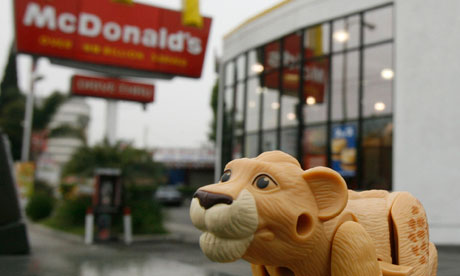
If you have kids you'll already be well aware of the mesmeric power of cheap plastic crap, or 'CPC' as it's known to bewildered parents worldwide. This is the generic term for the bright, plastic toylike objects which, though they have no play value or ability to hold a child's interest, can reduce even quite discerning kids into slavering, weeping heaps of keening acquisitiveness.
CPC is the stuff at fairgrounds, in party bags, in slot machines with rigged cranes, next to the tills at motorway service stations - pretty much anywhere, really, where you see normally sanguine parents with their tethers snapped on the point of threatening to bludgeon their shrieking toddler. It's dreadful stuff, as powerful and ubiquitous as the nastiest street drugs save for one small patch, one sane corner where good, honest burghers have finally said 'no more'. On 27 April a law was passed and very soon no toys will lawfully be given away with Happy Meals in the unincorporated areas of Santa Clara County.
I clearly have no understanding of the child brain because, to me, there could be no joy in owning these things. Rootling in the bottom of our toy basket I find a sedimentary layer of plastic figures from long forgotten Disney launches, part of a thing that was supposed to fly or explode and an amorphous pink glitter whatnot that may, or may not have once been part of a fairy trousseau or a unicorn hip replacement. What could the design brief have been? 'Make it unbelievably cheap' was certainly in there. There would definitely have been strictures against choking hazards, but where was the line that said, 'this object must have no earthly function, no ability to entertain, stimulate or even satisfy, a microsecond after the visceral urge to own has been sated'. Probably, it should be noted, a similar brief to the foods these gewgaws often accompany.
Parents who are interviewed always say that the toy never affects their choice. In their defence the fast food joints claim that the toy is a genuine gift and is in no way intended to tempt children to pester their parents. It's very similar to the argument the British ad industry makes; that there is no evidence that advertising has any effect on children, yet it continues to sell its services to clients by proprietary measures of behavioural change. (Try not to think about this piece of sophistry for too long, it has been know to make rational people's ears bleed.)
In truth this is a tiny gesture by a local authority with a disproportionate media impact. Santa Clara is home to Silicon Valley and Stanford University - half the money and most of the brains of California. A hundred or so restaurants are covered by the legislation, all outside of major towns and laws of this kind have a shorter lifespan than a dotcom in a country where big businesses lobby like there's no tomorrow and are prepared to cry unconstitutional restraint of trade at the drop of a writ (the county supervisors already granted a 90 day period of grace before the law comes into force to win majority support for the measure).
It does also raise interesting questions. Effective lobbying from advertising and broadcasting industries in the UK means that the whole debate about marketing to children has been pretty quiet. Even when the debate is live, we tend to legislate against direct selling to kids and ignore the obvious effects of advertising to children in order to indirectly change their parents' purchase decisions, what most of us call 'pester power', something the advertisers continue to deny exists yet which any parent can tell you does. In fact in this recent survey by Which? 38% of 8-11 year-olds said McDonald's was their favourite fast food chain because of the toys / Happy Meals. Which? say they are concerned "that these techniques could lead to children pestering their parents to take them to these restaurants regularly so they can collect the full range of toys". Parents will respond with a resounding "Well, duhrr!"
What do you make of toys offered as incentives to buy? Would you like to see some sort of ban?

